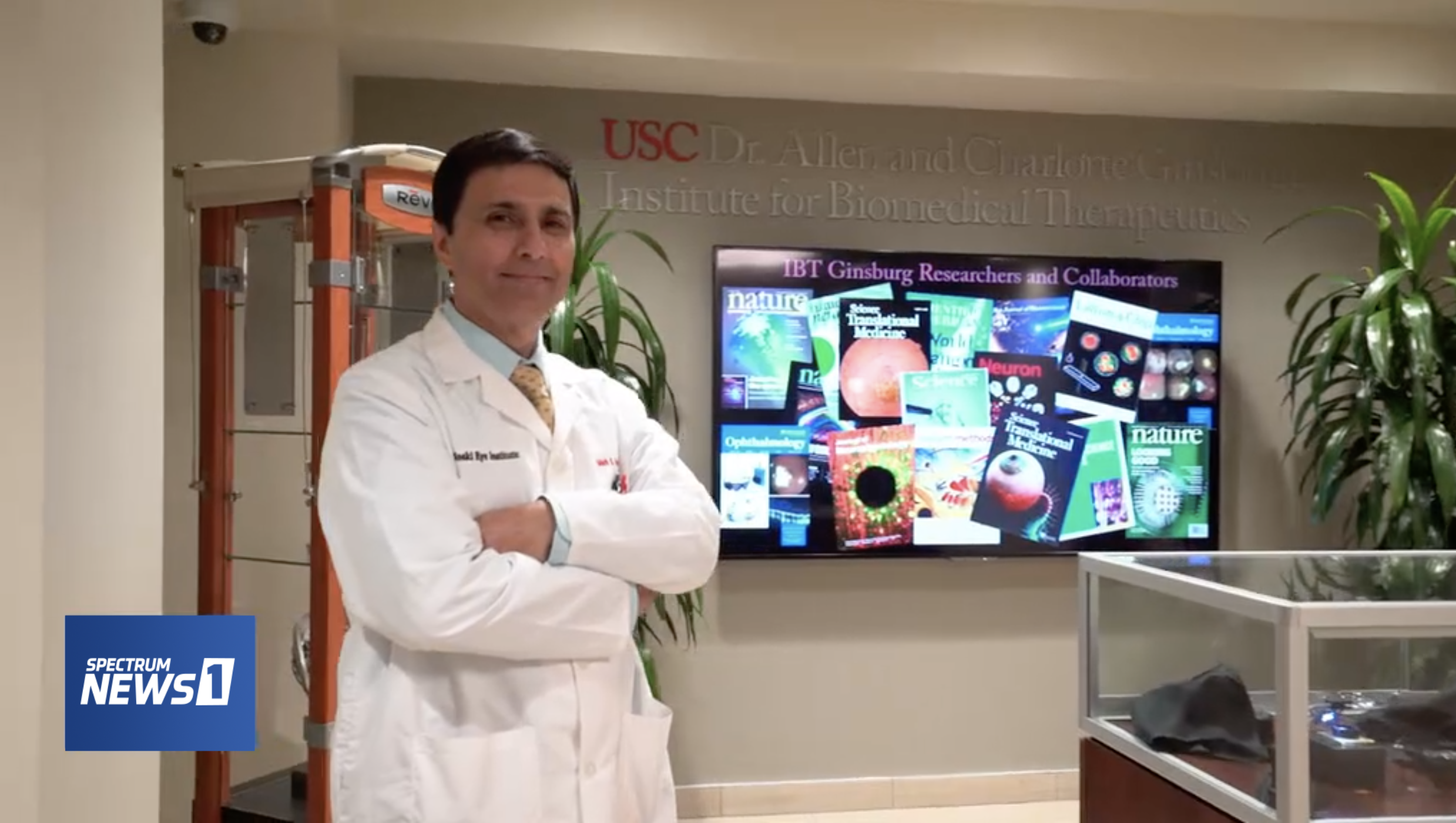By Alexandra Demetriou

Mark Humayun, MD, PhD, was featured in an episode of LA Stories with Giselle Fernandez, an Emmy Award-winning series on Spectrum News 1 dedicated to highlighting the “change agents” of Southern California who are shaping the future and imparting lasting changes on our community. Humayun, who serves as director of the USC Dr. Allen and Charlotte Ginsburg Institute for Biomedical Therapeutics and co-director of the USC Roski Eye Institute, was recognized for his pioneering work to treat blindness. On the episode, he shared his family history of practicing medicine, his inspiration to pursue a cure for blindness and his scientific achievements that impact a growing number of patients’ lives each day.
Humayun comes from a long lineage of physicians, but it was his grandmother’s progressive vision loss that spurred his interest in ophthalmology. He had originally planned on becoming a neurosurgeon, but watching his grandmother suffer alerted him to the urgency of curing blindness and he has since dedicated his career to that goal. If his late grandmother could see him today, she would be proud of his tireless commitment to advance the treatment for blindness, from developing the world’s first “bionic eye” to pioneering a stem-cell based treatment to revive the health of patients’ otherwise-degenerating retinas.
Humayun is widely recognized for developing the Argus II retinal implant, which uses electrical stimulation from a computer chip to help blind patients regain some of their eyesight. In 2016, he was awarded the National Medal of Technology and Innovation from President Barack Obama for development of the Argus II retinal implant and his profound and lasting contributions to advancing the biomedical sciences.
Humayun says the goal of developing a bionic eye initially seemed impossible to achieve, but memories of his grandmother’s struggle pushed him to stay dedicated despite the many challenges his team faced. Flash forward to today, and the implants have helped over 300 blind patients around the world partially regain their eyesight and enjoy an improved quality of life. “This idea of putting a computer chip in the eye to restore sight was truly science fiction, but we made it science fact,” Humayun says.
In addition to creating bionic eyes, Humayun and his team at the USC Ginsburg Institute have recently developed a stem-cell based retinal implant to treat age-related macular degeneration, the leading cause of blindness in the United States. Humayun hopes to further enhance the existing implants and make them available to more people. His team is currently integrating features such as infrared technology to help partially blind patients notice and avoid objects like a hot stovetop that could burn them. Such features could be seen as gifting patients with “superhuman” abilities, but Humayun quotes one of his patients who said that rather than making him feel like a cyborg, the bionic eye helps him feel more human because it allows him to interact with his surroundings more like everyone else.
Proof of Humayun’s life-changing work lies in his patients’ testimonies. Terry Byland, the only person in the world to have Argus implants in both of his eyes, was able to see the outline of his teenage son for the first time thanks to the devices. Anna Kuehl, one of the first patients to receive the stem-cell based retinal implant for macular degeneration, has regained enough of her eyesight to see her husband’s face again. Witnessing patients like Byland and Kuehl regain many of the lost joys in their lives inspires Humayun and often makes him think back to his own grandmother to appreciate how far treatment for blindness has come –– and how much further it has yet to go.
“Having that understanding of what my grandmother went through and this understanding of what we have been able to do, I’m able to talk to [patients] and provide them with hope,” Humayun says, and his commitment to enhancing the treatment of blindness despite its challenges is evident. “You just have to say, I’m going to solve this problem, I don’t know how long it’s going to take, but however long it takes, we’ll give it the time because it is worth it.”
To watch Humayun’s complete interview on LA Stories with Giselle Fernandez, click here.